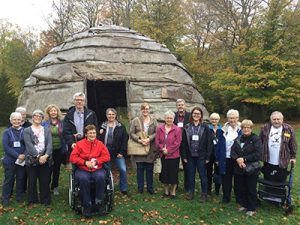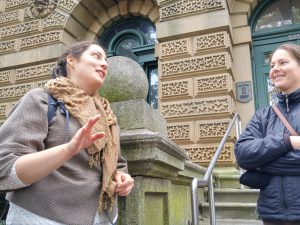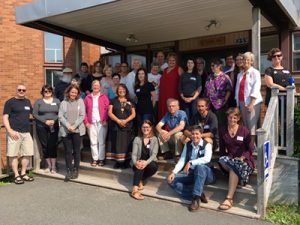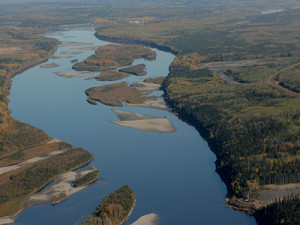Holy Trouble in the Watershed
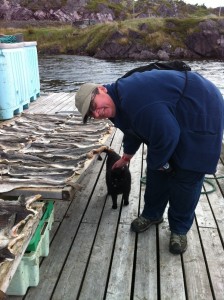
Sara Stratton with a friend at a salt cod flake in Southport, Trinity Bay, Newfoundland, September 2012. Photo: Kelly Buehler
Preached at Trinity St. Paul’s United Church, 09 February 2014
Texts:
Isaiah 58:1-12
1 Corinthians 2: 1-16
Matthew 5: 13-20
On July 2, 1992, I was one of many Newfoundlanders who turned on CBC Newsworld to watch federal fisheries minister John Crosbie announce that after years of decline, the government was imposing a moratorium on the cod fishery, a fishery that defined Newfoundland’s existence. In an instant, peoples’ lives were changed forever, as was the social fabric of the entire province.
My family, on both sides, came to Northwestern Bonavista Bay from southwest England beginning in the 1700s, when the first Stratton is recorded as living in Greenspond. My grandfathers worked in the fishery from the time they were young boys until their 40s and 50s. It wasn’t lucrative, and my Granddad Osmond eventually did leave for salaried work in the mill in Corner Brook. But generations of Newfoundlanders continued to fish and make some kind of a living out of the cod fishery until 1992.
Between the 1950s and the 1990s, as the offshore fishery grew more and more mechanized, inshore fishermen – those who went out and back every day in small boats – noticed that they were bringing in fewer and smaller codfish. There were other changes as well. The capelin run is a big social activity in Newfoundland; capelin is a small silvery fish that cod feed on, and when masses of them roll ashore to spawn every June, people truck down to the beach both to watch a magnificent display of nature and to catch as many fish as they can to roast, dry, or use for fertilizer in gardens. By the early 1990s, though, capelin runs were noticeably reduced.
Inshore fishermen knew exactly why this was happening, and they had been saying so for years. It was because of large trawlers that scooped up everything in their path, especially factory-freezer trawlers –some Canadian, some international– that could park off the Grand Banks and suck up and process fish at a rate bearing no resemblance to the more sustainable fishing practices of previous generations, let alone the inshore fishery. Northern cod can take up to 8 years to begin their reproductive cycle, but fish of all ages were being caught and processed on the banks, so the breeding stock collapsed. And it wasn’t just cod. Capelin were being taken as “bycatch” or waste. So not only were most of the cod being taken before they got anywhere near shore, there was little food left for those that did survive.
In other words, over a 40 year period, industrial fishing wiped out an ecosystem that had sustained an economy and a way of life for 500 years. And the people who were closest to it knew this. These fishermen knew their watershed – they saw what was happening to it, they spoke up for it; they advocated for it. Tragically, they were ignored by corporations and governments who had no trust in their wisdom but every belief in the importance of profit.
One of the things you often hear as a Newfoundlander is “you people are the salt of the earth.” Frankly, I can be rather suspicious of this and I often wonder what people mean when they say it. Is it a platitude? An insult? If so, I think people are missing the point of what it means to be salt of the earth. Salt’s a pretty valuable commodity. In Jesus’ time, it would have been an important and prized preservative, just as it was for most of recorded history. When we value someone’s words and actions, we sometimes say they’re worth their salt.
And there’s a sharpness to salt that makes a point. Stick your finger in the sugarbowl and lick it off. Pleasant. Stick your finger in a box of salt and lick that off. Hello.
Those fishermen who spoke out against the industrial fishery truly were, I think, the salt of the earth. And they didn’t hide their light under a bushel. They told the truth, they bore witness, they made trouble.
Today’s texts are, I think, a testament to troublemaking. Holy trouble in the watershed. Isaiah and Matthew do so in the form of dissent with or critique of established religious code; Corinthians in the form of instruction on how to be church. Isaiah insists that true faith demands speaking out and working for justice: “Shout out, do not hold back! Lift up your voice like a trumpet! Announce to my people their rebellion!” Matthew tells us to speak up, to cast a light on all that is unjust. Corinthians tells us to trust in the wisdom we know we have even though the powers and principalities might deem us foolish.
This is what Newfoundland’s inshore fishermen were doing. And this, I would argue, is key in the practice of watershed discipleship.
Watershed discipleship is a process of learning more about our place (our watershed) and the injustices that affect it, and committing to end those injustices. KAIROS is part of a growing North American movement that has chosen to use the language of discipleship not just because of its keen connection to Jesus’ ministry, but also because it implies relationship with the watershed itself: the Latin root of the word is discupulus, from discere, meaning “to learn.” Watershed discipleship implies learning about and being in relationship with the land, the water, and all that is in it.
There are 594 local watersheds across Canada, most of which flow into one of North America’s five major watersheds: the Atlantic Ocean, Hudson Bay, the Arctic Ocean, the Gulf of Mexico, and the Pacific Ocean. And because these empty out into the oceans, they are connected to each other, and to watersheds around the world. Through watersheds, through water and land and all the beings that depend on them we and our struggles are all connected.
But the word “watershed” is not just used by geographers. It also refers to time, as in a “watershed moment” when things have no choice but to change.
In the 1970s and 80s, we were at such a moment with respect to the Northern cod fishery, and we ignored it. We are at such a moment in Canada again right now, and we ignore it at our peril. Our watershed moment concerns the impacts of resource extraction, fossil fuel addiction, and climate change on the land, the water, and all life. Most resource extraction, here in Canada and around the world, happens on the traditional territory of Indigenous peoples. And if, as the Truth and Reconciliation Commission starts drawing to a close, we are truly going to live into reconciliation, then we have to think long and hard about the conduct and impacts of the extractive sector. We need to think about what reconciliation looks like – with Indigenous peoples and with the land.
What actions can we take as watershed disciples in this context? What is the rather salty truth that we need to tell? Where do we need to cast the light of our lamp? The climate justice working group here at Trinity St. Paul’s is offering us one option – to put our money where our mouths are; to question the validity of tar sands, pipelines, and fracking; to forego profit for the good of the watershed, the good of the earth. Financial planners might deem that foolish, but that may be a foolishness we are comfortable with, a risk we are willing to take.
KAIROS and the United Church are also involved in a campaign called Open for Justice that can be a step in our watershed discipleship journey. The fact that watersheds are almost all connected to each other isn’t just geography; it’s also business. Canadian mining and oil and gas companies work in watersheds all over the world. In fact, close to 60% of the world’s mining and mineral exploration companies are headquartered in Canada. 40% of the world’s mineral exploration capital is raised on Canadian stock exchanges.
That means that Canada has a particular responsibility when it comes to the behaviour of those companies. However, it is a responsibility that we try to avoid. For example, until very recently we have refused to give victims of human rights or environmental abuse occurring in the course of Canadian mining activity access to Canadian courts or an ombudsman.
Take a recent case in Guatemala, for example. Angelica Choc is a Maya woman from Guatemala’s nickel-rich region of El Estor. Her husband Adolfo Ich Chaman, a teacher and community leader who opposed the activities of a Canadian mining company in the area, was brutally killed in 2009, allegedly by a security guard with links to the mine. In the fall of 2013 it was determined that Angelica could bring her case before an Ontario court, but this is a one-off and there is no firm timeline on when the case will come forward.
What happened to Angelica’s husband should never have happened. The community should have been consulted before the mine ever opened; it’s now enshrined in the UN Declaration on the Rights of Indigenous Peoples that they have to right to Free, Prior, and Informed Consent on developments on their territory. Concerns about the impacts on the watershed should have been dealt with. But the fact is in Guatemala and in countries all over the world, that doesn’t happen.
The Open for Justice campaign is therefore about ensuring that access to Canadian courts and a extractives sector ombudsman is a norm of doing business. It’s about saying that we will be accountable in our watershed for what we do in others’. You can join this campaign online at the KAIROS website, and let your MP know that you want them to fight for Canada to be Open for Justice.
The United Church recently sent a delegation to Guatemala, and they spent time with Angelica, her children, and their community. They went swimming in Angelica’s watershed, in Lake Izabel, which butts right up against the nickel mine. Delegation participant Emma Hobbs wrote, after that day of swimming, that “where I feel closest to creation is swimming in lakes…” and that her experience made her see the connection between the struggles of El Estor and the struggles against fracking in her New Brunswick watershed. She saw a profound connection between these two places and the peoples: “I realize we’re all trying to save our world.”
There’s a cost in speaking out, in making trouble. It cost Adolfo Ich Chaman his life. But there is a cost in not raising our voices as well. There are tremendous environmental costs. And there is a cost to our personhood; I think we are diminished when we don’t honour people like Adolfo by carrying on their struggles. I think we are diminished when we don’t honour our Indigenous sisters and brothers by joining with them in protecting the land.
Isaiah 58 is quite possibly my favourite passage in the Bible. I know it almost by heart. As I was preparing this sermon, I read it over again. I thought of 300 years worth of Strattons and Osmonds fishing in Bonavista North, and could not help but re-imagine the last verse. I don’t expect you’ll mind too much if I play with the text a little bit:
Your ancient ruins shall be rebuilt; you shall raise up the foundations of many generations;
You shall be called the repairer of the breach; the restorer of seas for fish to swim in.
With the grace of God, and the help of our hands, may it someday be so.
Sara Stratton is Member Relations and Campaigns Coordinator for KAIROS. She is originally from the Humber watershed of Western Newfoundland. A member of the United Church of Canada, she distinguished herself at an early age by placing a quarter in the collection plate and taking back 20 cents change.









